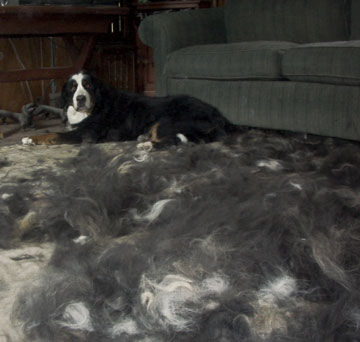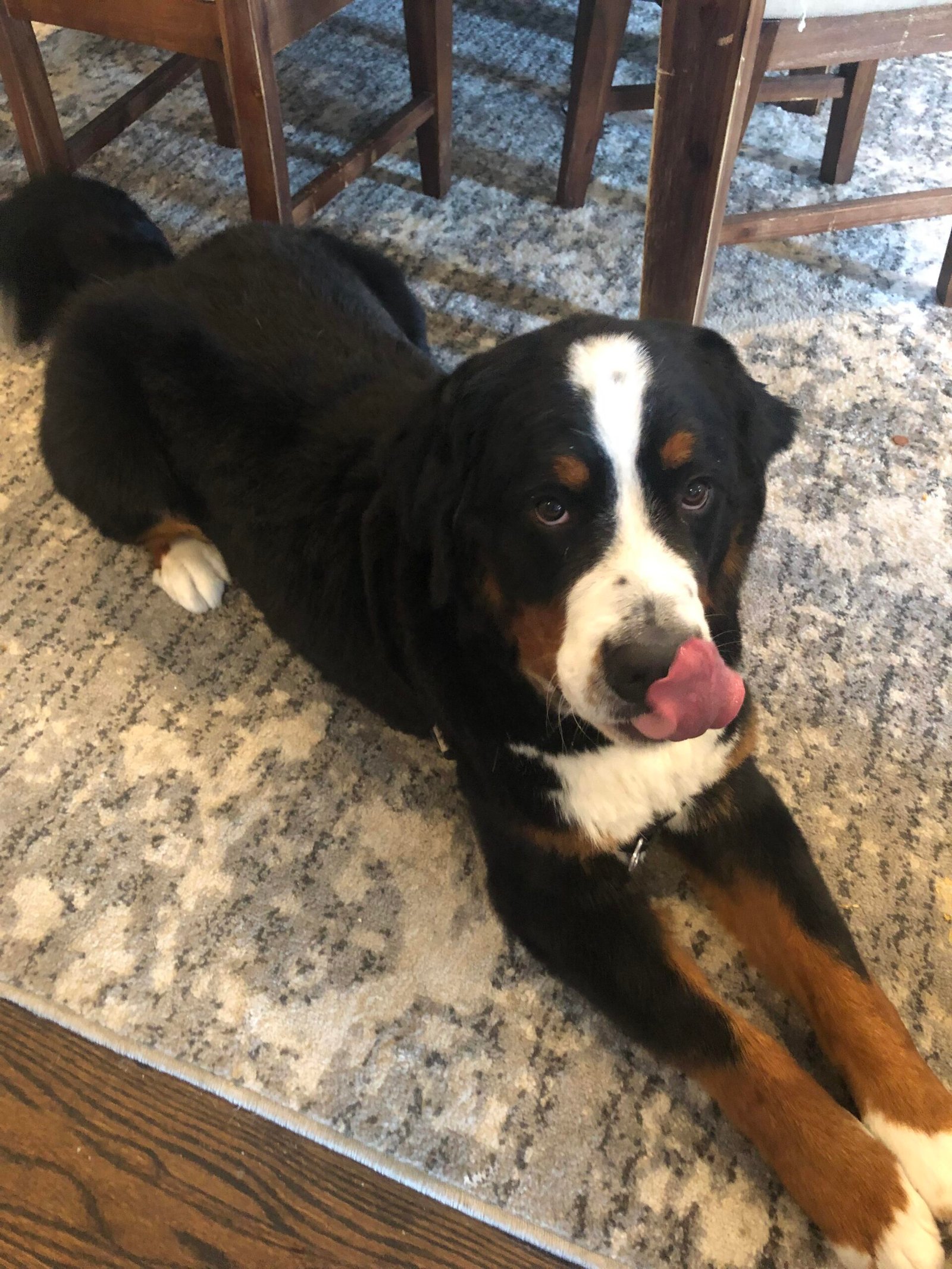Have you ever wondered, will Bernese Mountain Dog hair grow back? Well, you’re in luck! In this article, we’ll explore the fascinating world of Bernese Mountain Dog hair growth and provide you with all the information you need. So, let’s dive in and unravel the mystery behind those luxurious, fluffy coats!
Bernese Mountain Dogs are known for their beautiful, thick fur that keeps them warm in colder climates. But what happens if your furry friend loses some of that lush hair? Don’t worry, their hair is designed to grow back and restore their majestic appearance. Whether it’s due to shedding, grooming, or a health issue, Bernese Mountain Dog hair has the incredible ability to regenerate to its former glory. So, rest assured that your Bernese Mountain Dog’s coat will always be as stunning as ever!
Understanding the factors influencing hair growth in Bernese Mountain Dogs is crucial. Maintaining a healthy diet, regular grooming routine, and addressing any underlying health issues can help ensure optimal hair growth. Remember, just like with humans, the speed and quality of hair growth can vary from one dog to another. So, be patient and provide your Bernese Mountain Dog with the care it deserves, and you’ll soon witness those beautiful strands of fur growing back in no time!
Now that you know the answer to “will Bernese Mountain Dog hair grow back,” you can confidently care for your beloved pet’s coat. With proper grooming, nutrition, and attention to their overall health, you can help their hair flourish. So, keep those brushes handy, and embrace the joy of seeing your Bernese Mountain Dog’s magnificent fur regrow and showcase their natural beauty!

Will Bernese Mountain Dog Hair Grow Back: A Comprehensive Guide
Introduction:
The Bernese Mountain Dog is a beloved breed known for its beautiful, thick coat. However, like all dogs, there may be instances where a Bernese Mountain Dog experiences hair loss due to various reasons. This can be concerning for pet owners, who may wonder if the dog’s hair will grow back. In this comprehensive guide, we will explore the factors that can cause hair loss in Bernese Mountain Dogs and discuss whether their hair will indeed grow back.
Reasons for Bernese Mountain Dog Hair Loss
1. Allergies:
Allergies are a common cause of hair loss in Bernese Mountain Dogs. These can be triggered by food, environmental factors, or seasonal changes. If your dog is experiencing hair loss due to allergies, it is important to identify and eliminate the allergen. In most cases, once the allergen is removed, the dog’s hair will grow back.
In some cases, allergies may require medical intervention. Consult your veterinarian for proper diagnosis and treatment options.
2. Infections and Parasites:
Another reason for hair loss in Bernese Mountain Dogs is infections or infestations caused by parasites such as fleas and ticks. These can lead to intense itching and scratching, resulting in hair loss. Additionally, fungal or bacterial infections can cause hair to fall out.
Seek veterinary care to properly diagnose the underlying cause of the hair loss and to administer appropriate treatment. With proper medical intervention, the hair will usually grow back once the infection or infestation is resolved.
3. Hormonal Imbalance:
Hormonal imbalances, such as hypothyroidism or Cushing’s disease, can result in hair loss in Bernese Mountain Dogs. These conditions affect the dog’s endocrine system, which can disrupt normal hair growth cycles.
If your Bernese Mountain Dog is experiencing hair loss due to hormonal issues, consult with your veterinarian for proper diagnosis and treatment. Once the underlying hormonal imbalance is addressed, the hair should grow back.
Can Bernese Mountain Dog Hair Grow Back after Hair Loss?
Yes, in most cases, Bernese Mountain Dog hair will grow back after experiencing hair loss. However, the regrowth process can vary depending on the underlying cause. Once the underlying issue is addressed and appropriate treatment is administered, hair growth typically resumes.
It is important to note that the regrowth process may take time. Hair growth in dogs occurs in cycles, and it can sometimes take several weeks to months before the hair fully regrows. Patience is key during this process, and consistent veterinary care is essential to ensure proper healing and regrowth.
While waiting for the hair to grow back, it is important to provide your Bernese Mountain Dog with a healthy diet, regular grooming, and a comfortable living environment. These factors contribute to overall coat health and can aid in the regrowth process.
Preventing Hair Loss in Bernese Mountain Dogs: Tips and Advice
1. Proper Nutrition:
A well-balanced diet that includes all the necessary nutrients is crucial for maintaining a healthy coat. Ensure that your Bernese Mountain Dog’s diet consists of high-quality, premium dog food. You may also consider incorporating supplements that promote coat health, such as omega-3 fatty acids.
2. Regular Grooming:
Frequent brushing helps stimulate blood circulation to the hair follicles and removes loose hair and debris. This prevents matting and reduces the risk of infections or infestations.
3. Environmental Control:
Keep your Bernese Mountain Dog’s living space clean and free of allergens. Regularly wash bedding, vacuum carpets, and minimize exposure to potential irritants.
4. Regular Veterinary Check-ups:
Stay proactive with your dog’s health by scheduling regular check-ups with your veterinarian. This allows for early detection and treatment of any potential issues that may lead to hair loss.
Treating Hair Loss in Bernese Mountain Dogs
1. Medical Intervention:
If your Bernese Mountain Dog experiences hair loss, it is crucial to seek veterinary care for proper diagnosis and treatment. Depending on the underlying cause, your veterinarian may prescribe medications, advise dietary changes, or recommend topical treatments.
2. Treat the Underlying Cause:
In order for the hair to grow back, it is essential to address the root cause of the hair loss. By treating allergies, infections, or hormonal imbalances, you can promote hair regrowth.
3. Supportive Care:
While waiting for the hair to regrow, provide your Bernese Mountain Dog with a comfortable and stress-free environment. Offer love, care, and patience as they go through the regrowth process.
Conclusion:
Experiencing hair loss can be worrisome for Bernese Mountain Dog owners, but in most cases, their hair will grow back. By identifying and treating the underlying cause of hair loss, providing proper nutrition and grooming, and seeking veterinary care, you can help promote hair regrowth and maintain a healthy coat for your beloved Bernese Mountain Dog.
Key Takeaways: Will Bernese Mountain Dog Hair Grow Back
- The hair of Bernese Mountain Dogs will naturally grow back after shedding or trimming.
- Proper grooming and regular brushing can help maintain a healthy coat and encourage hair growth.
- Factors like age, health, and genetics can affect the rate of hair regrowth in Bernese Mountain Dogs.
- Consulting with a veterinarian or a professional groomer can provide additional guidance and advice on promoting hair growth.
- Patience is key when waiting for Bernese Mountain Dog hair to grow back, as it may take time for new hair to fully regrow.
Frequently Asked Questions
Have questions about whether a Bernese Mountain Dog’s hair will grow back? Find the answers you’re looking for below!
1. How long does it take for Bernese Mountain Dog hair to grow back after shedding?
The rate at which Bernese Mountain Dog hair grows back can vary depending on several factors. Typically, it takes around 3 to 4 months for a Bernese Mountain Dog’s hair to fully grow back after shedding. However, this can be influenced by factors such as the dog’s overall health, diet, and genetic disposition.
To help promote hair regrowth in your Bernese Mountain Dog, ensure they are getting a balanced diet with proper nutrition. Regular grooming and brushing can also stimulate hair follicles and promote faster hair growth. If you have concerns about your dog’s hair not growing back within a reasonable timeframe, it’s best to consult with a veterinarian.
2. Are there any health conditions that can affect a Bernese Mountain Dog’s hair growth?
Yes, there are a few health conditions that can potentially impact a Bernese Mountain Dog’s hair growth. One example is hypothyroidism, a condition where the thyroid gland does not produce enough hormones. This can lead to hair loss or poor hair regrowth. Other conditions such as allergies, fungal infections, or hormonal imbalances can also affect the dog’s coat.
If you notice abnormal hair loss or patches of hair not growing back, it’s important to have your Bernese Mountain Dog examined by a veterinarian. They can determine if there is an underlying health issue causing the hair growth problems and provide appropriate treatment.
3. Can certain grooming practices affect a Bernese Mountain Dog’s hair regrowth?
Grooming practices can indeed have an impact on a Bernese Mountain Dog’s hair regrowth. Regular brushing helps remove loose fur and dead hair, stimulating the hair follicles and promoting healthier hair growth. However, excessive grooming or using harsh grooming tools can potentially damage the hair and slow down the regrowth process.
It’s important to use gentle and appropriate grooming techniques, such as using a slicker brush or a comb specifically designed for a Bernese Mountain Dog’s coat. Avoid excessive brushing or pulling on the hair, as this can cause breakage and hinder regrowth. If you’re unsure about the best grooming practices for your Bernese Mountain Dog, consult with a professional groomer.
4. Does the age of a Bernese Mountain Dog affect its hair regrowth?
Yes, the age of a Bernese Mountain Dog can have an impact on its hair regrowth. Generally, younger dogs have faster hair regrowth compared to older dogs. Puppies have more active hair follicles, so their hair tends to grow back more quickly. As a dog ages, the hair follicles may become less active, leading to slower hair regrowth.
This doesn’t mean that older Bernese Mountain Dogs won’t have their hair grow back at all. It simply means the regrowth process may take longer. Providing proper nutrition, maintaining good overall health, and regular grooming can help support hair regrowth in dogs of all ages.
5. Can stress or anxiety affect a Bernese Mountain Dog’s hair regrowth?
Yes, stress and anxiety can impact a Bernese Mountain Dog’s hair regrowth. Just like humans, dogs can experience hair loss or slower hair regrowth due to emotional and psychological factors. Stressful situations, changes in the environment, or separation anxiety can trigger hair loss or hinder regrowth.
If you suspect that stress or anxiety is affecting your Bernese Mountain Dog’s hair regrowth, it’s important to address the underlying cause. Creating a calm and secure environment, providing mental and physical stimulation, and seeking professional help if needed, can all help reduce stress and promote healthier hair regrowth.

Watch My Bernese Mountain Dog Puppy Grow Up in 30 Seconds
Summary
So, to recap, if your Bernese Mountain Dog loses their hair due to illness or medication, it will generally grow back once they are healthy again. However, if your dog’s hair falls out due to aging or genetics, it is unlikely to grow back. The best thing you can do is to provide a healthy diet and proper grooming to keep their coat in good condition. Remember, each dog is unique, so it’s always a good idea to consult with a veterinarian for personalized advice.
